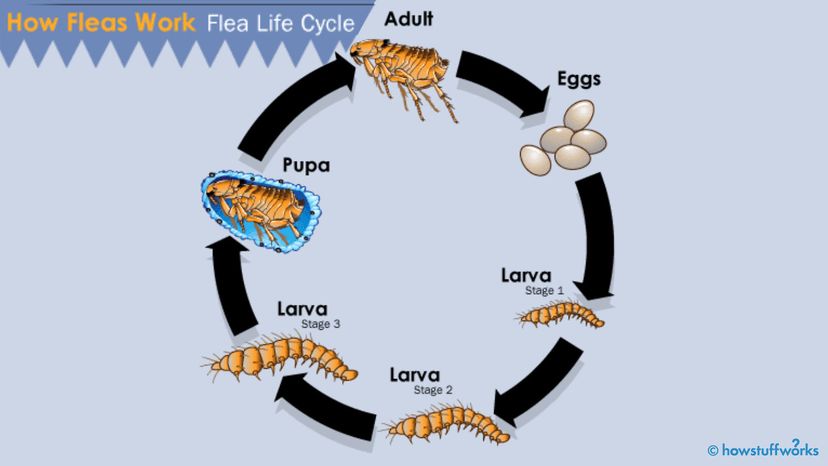The Flea Life Cycle

Fleas reproduce a lot like butterflies. Females lay eggs that hatch into worm-like larvae. The larvae then spin cocoons and become pupae, and an adult flea emerges from the cocoon. In a population of fleas, about half are eggs and 5 percent adults.
Female fleas can lay eggs only if they've had a meal. If a female emerges from her cocoon and isn't able to find food, she'll die without reproducing. But once she's eaten, a flea can lay close to 20 eggs at a time, for a total of 500 eggs during her lifetime.
Advertisement
Most of the time, fleas lay their eggs on their host. The eggs are completely smooth, so they slide off the host and land in its environment. In people's homes, the eggs sink deep into carpet fibers and floor cracks. Outside, flea eggs settle into the soil. Flea eggs are white — the black specks you see on flea-infested animals and their bedding are particles of dried blood and flea droppings.
Flea eggs need a warm, moist environment with a temperature of about 70 degrees Fahrenheit (21 degrees Celsius) and 70 to 85 percent humidity to develop. In these conditions, the eggs hatch in about 12 days. This 12-day window is one of the reasons why it can be hard to get rid of fleas. Some insecticides kill adult fleas but not eggs, which means a whole new set of fleas can emerge after the adults have died.
Flea larvae are about 0.5 inches (1.5 millimeters) long and look like white, segmented worms. They avoid light and migrate toward cracks in the floor, where they remain for their development. Unlike their parents, the larvae don't eat blood. Instead, they eat skin cells, flea droppings and other debris. Larvae develop through three stages, or instars, molting after each.
After a week or two, flea larvae spin silk cocoons. They attach pieces of dirt and debris to their cocoons as camouflage. If food is plentiful, the adult flea emerges after about a week. Otherwise, the flea may stay in its cocoon for up to a year.
Although flea larvae and adults have completely different eating patterns, what they eat has a big impact on the diseases fleas can carry. Next, we'll take a look at flea-borne illnesses and complications from flea bites.